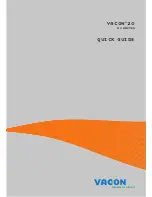
Appendix
Communication with MotionBus/system bus (CAN)
Process data transfer
450
EDBCSXS064 EN 4.0
13.4.3.3
Transfer of the process data objects
Process data objects
Data transmission
ECSxE
ECSxS/P/M/A
RPDOs
(to ECS module)
AIF1_IN
˘
cyclic (sync−controlled)
CAN1_IN
cyclic (sync−controlled)
CANaux1_IN
˘
AIF2_IN
˘
event−controlled/cyclic without sync
CAN2_IN
˘
CANaux2_IN
˘
AIF3_IN
˘
event−controlled/cyclic without sync
CAN3_IN
event−controlled/cyclic without sync
CANaux3_IN
˘
TPDOs
(from ECS module)
AIF1_OUT
˘
cyclic (sync−controlled)
CAN1_OUT
cyclic (sync−controlled)
CANaux1_OUT
˘
AIF2_OUT
˘
event−controlled/cyclic without sync
CAN2_OUT
˘
CANaux2_OUT
˘
AIF3_OUT
˘
event−controlled/cyclic without sync
CAN3_OUT
event−controlled/cyclic without sync
CANaux3_OUT
˘
ƒ
Cyclic data transmission with sync telegram (
(via AIF1, CAN1, CANaux1)
The sync telegram enables the controller to accept the process data from the master
(RPDOs) or send them to the master (TPDOs).
ƒ
Event−controlled data transmission
(via AIF2/3, CAN2/3, CANaux2/3)
The data will be transmitted if a value changes in the corresponding output object.
ƒ
Cyclic data transmission without sync telegram
(via AIF2/3, CAN2/3, CANaux2/3)
The data is transmitted in fixed times. The cycle time can be set via the following codes:
Interface
Code
X1
Automation interface (AIF)
C2356
X4
ECSxS/P/M: MotionBus (CAN)
ECSxA/E: System bus (CAN)
C0356
X14
System bus (CAN)
l
Interface is not available for ECSxE.
C2456
– Setting of cycle time > 0: data transmission with fixed cycle time
– Setting of cycle time = 0: event−controlled data transmission
















































